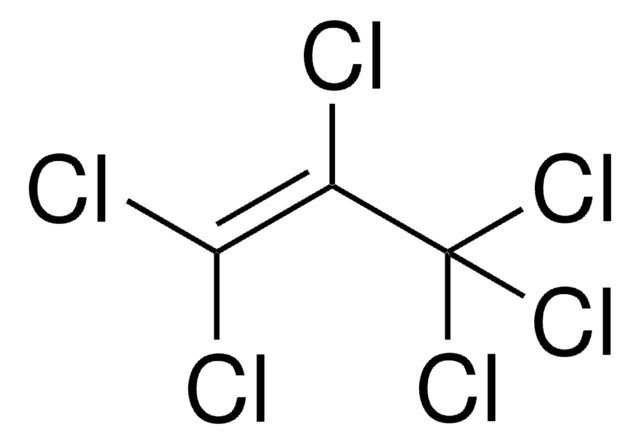320269
Dichloromethane
ACS reagent, ≥99.5%, contains 40-150 ppm amylene as stabilizer
Synonym(s):
methylene chloride, Methylene chloride
About This Item
Recommended Products
grade
ACS reagent
Agency
suitable for EPA 1613
vapor density
2.9 (vs air)
vapor pressure
24.45 psi ( 55 °C)
6.83 psi ( 20 °C)
Assay
≥99.5%
form
liquid
autoignition temp.
1223 °F
contains
40-150 ppm amylene as stabilizer
expl. lim.
22 %
impurities
Free halogens, passes test
≤0.0003 meq/g Titr. acid
≤0.02% water
evapn. residue
≤0.002%
color
APHA: ≤10
clear
refractive index
n20/D 1.424 (lit.)
bp
39.8-40 °C (lit.)
mp
−95 °C (lit.)
density
1.325 g/mL at 25 °C (lit.)
SMILES string
ClCCl
InChI
1S/CH2Cl2/c2-1-3/h1H2
InChI key
YMWUJEATGCHHMB-UHFFFAOYSA-N
Looking for similar products? Visit Product Comparison Guide
Application
- Rapid and Comprehensive Analysis of 41 Harmful Substances in Multi-Matrix Products by Gas Chromatography-Mass Spectrometry Using Matrix-Matching Calibration Strategy.: This research uses gas chromatography-mass spectrometry (GC-MS) to analyze harmful substances across various matrices. Dichloromethane is employed as a solvent in the preparation phase, highlighting its application in ensuring accurate and efficient analytical results (Wang Y et al., 2024).
- Brunonianines D-F, three new C19-diterpenoid alkaloids from the Delphinium brunonianum, with therapeutic effect on ovarian cancer in vitro and in vivo.: This study identifies new alkaloids with potential anti-cancer properties, where dichloromethane is utilized in the extraction and isolation processes. Its effectiveness in separating and preserving delicate compounds is critical for their pharmacological evaluation (Li Q et al., 2024).
- LC-HRMS and GC-MS Profiling of Urine Free Cortisol, Cortisone, 6Β-, and 18-Hydroxycortisol for the Evaluation of Glucocorticoid and Mineralocorticoid Disorders.: Utilizes LC-HRMS and GC-MS to profile hormones in urine, with dichloromethane being crucial in the extraction process. This method ensures precision and sensitivity in hormone measurement, essential for diagnosing endocrine disorders (Casals G et al., 2024).
- Determination of vancomycin and meropenem in serum and synovial fluid of patients with prosthetic joint infections using UPLC-MS/MS.: Features a method to measure antibiotics in biological fluids, where dichloromethane is used to prepare samples. This study underscores the solvent′s role in achieving high resolution and detection limits in clinical diagnostics (He J et al., 2024).
Features and Benefits
related product
Signal Word
Warning
Hazard Statements
Precautionary Statements
Hazard Classifications
Carc. 2 - Eye Irrit. 2 - Skin Irrit. 2 - STOT SE 3
Target Organs
Central nervous system
Storage Class Code
6.1D - Non-combustible acute toxic Cat.3 / toxic hazardous materials or hazardous materials causing chronic effects
WGK
WGK 2
Flash Point(F)
does not flash
Flash Point(C)
does not flash
Certificates of Analysis (COA)
Search for Certificates of Analysis (COA) by entering the products Lot/Batch Number. Lot and Batch Numbers can be found on a product’s label following the words ‘Lot’ or ‘Batch’.
Already Own This Product?
Find documentation for the products that you have recently purchased in the Document Library.
Customers Also Viewed
Related Content
This page is intended to make it easier to find the consumables you need based on the analytical method you’re using. Methods included on this page come from the EPA, Standard Methods and ASTM.
This page is intended to make it easier to find the consumables you need based on the analytical method you’re using. Methods included on this page come from the EPA, Standard Methods and ASTM.
This page is intended to make it easier to find the consumables you need based on the analytical method you’re using. Methods included on this page come from the EPA, Standard Methods and ASTM.
This page is intended to make it easier to find the consumables you need based on the analytical method you’re using. Methods included on this page come from the EPA, Standard Methods and ASTM.
Our team of scientists has experience in all areas of research including Life Science, Material Science, Chemical Synthesis, Chromatography, Analytical and many others.
Contact Technical Service




